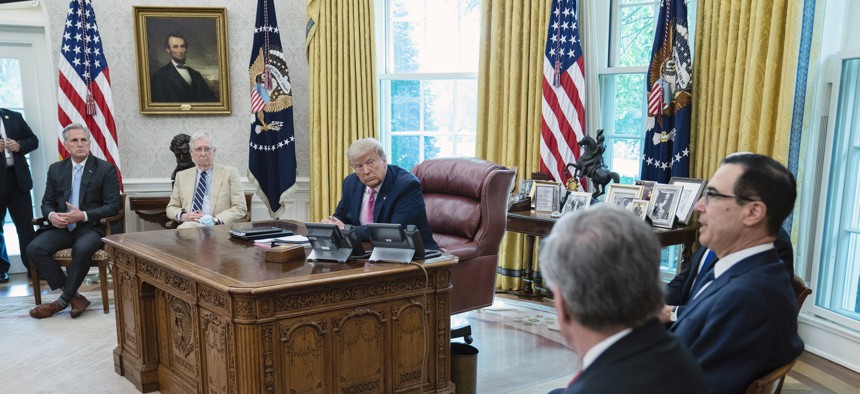Sen. Mitch McConnell Lays Out Priorities for GOP Coronavirus Bill

House Minority Leader Kevin McCarthy of Calif., left, speaks during a meeting with Senate Majority Leader Mitch McConnell of Ky., center, and President Donald Trump in the Oval Office of the White House, Monday, July 20, 2020, in Washington. AP Photo/Evan Vucci
Funding for schools, direct stimulus payments to Americans, and targeted aid for businesses will be included in the proposal, but he didn't mention state and local funding.
Senate Republicans’ next proposal for a coronavirus package will include $105 billion for schools, another round of direct stimulus payments to Americans, and a targeted round of aid for businesses, Senate Majority Leader Mitch McConnell said Tuesday.
McConnell provided a broad outline for the plan as Treasury Secretary Steven Mnuchin and White House chief of staff Mark Meadows made the rounds on Capitol Hill to begin negotiating elements of the proposal with congressional lawmakers.
Republicans and Democrats have vastly different priorities for the aid package and will have to overcome numerous divisions in order to agree on a proposal. But not even Senate Republicans and the White House have been able to come to agreement on all aspects of the bill, including President Trump’s support for a payroll tax cut.
McConnell acknowledged that Republicans will have to negotiate with Democrats on the bill, which is being crafted behind closed doors, but said he did not believe “there will be anything in our bill that our Democratic colleagues should not happily support.”
“The legislation that I have begun to sketch out is neither another CARES Act to float the entire economy, nor a typical stimulus bill for a nation that’s ready to get back to normal,” McConnell said in a speech on the Senate floor.
McConnell did not mention financial support for state and local governments, which Sen. Chuck Schumer highlighted Monday as a spending priority in a letter to Democratic colleagues. The Democrat-led House has already passed a $3 trillion coronavirus relief proposal that provides more than $900 billion for state and local governments and some Republican senators have also voiced support for including that kind of funding in the next spending plan.
White House officials were set to meet Tuesday with Schumer and House Speaker Nancy Pelosi in addition to GOP lawmakers. Pelosi said she hoped lawmakers would be able to resolve their differences in time to “have a bill by the end of next week.”
In addition to funding to help schools bring children safely back into classrooms, McConnell said Republicans’ bill would also back efforts to get Americans back to work by including “incentives to hire and retain workers” and to reimburse businesses for costs associated with coronavirus protections.
“The legislation will help reimburse for safe workplaces, so that Main Street can afford the PPE, testing, cleaning, or remodeling to protect workers and entice customers,” he said.
The Republican proposal would also provide more funding for two elements included in previous aid packages—direct stimulus payments to Americans and the Paycheck Protection Program for businesses.
McConnell did not discuss the amount of money that would be targeted for each effort, but he indicated that they would be more narrowly tailored than the previous iteration. Adults making up to $75,000 were issued $1,200 stimulus checks under a previous aid package.
More than $520 billion in PPP loans to businesses had been distributed as of last week and another $130 billion has not been doled out. McConnell said the next round of relief would include a “targeted second round” of PPP loans for hard-hit businesses.
Local leaders renewed calls for inclusion of state and local aid on Tuesday. While the CARES Act allotted $139 billion specifically for state and local governments, size restrictions meant only 38 cities with more than 500,000 people received direct funding, according to the U.S. Conference of Mayors. In addition, the law doesn’t allow governments to use the money to make up for lost tax revenues that allow them to keep service going.
“From the start, cities have been on the front lines of the fight against this disease, coordinating local responses and devoting significant resources to help keep people safe,” the organization wrote in a letter sent to congressional leaders Tuesday. “At the same time, as economies shut down, cities have experienced a precipitous decline in tax revenue—the full impact of which economists expect to grow. Together, these dynamics have decimated city budgets in cities large and small.”
They urged lawmakers “not to leave cities behind” in the next aid package, the last likely to be enacted ahead of the November elections.
Andrea Noble is a staff correspondent with Route Fifty.
NEXT STORY: Business Loans, Unemployment Insurance to Factor into Talks on Next Coronavirus Bill





